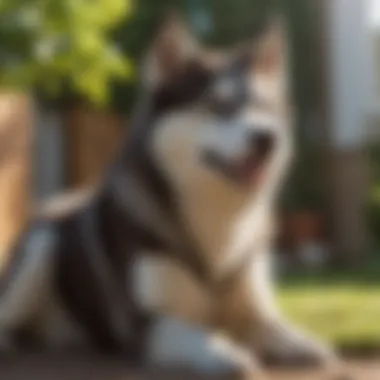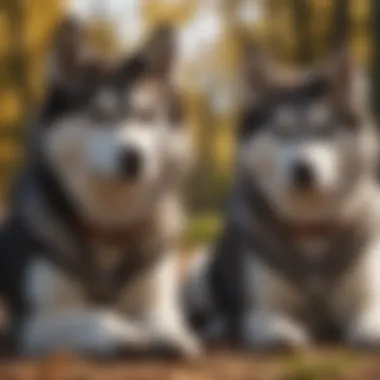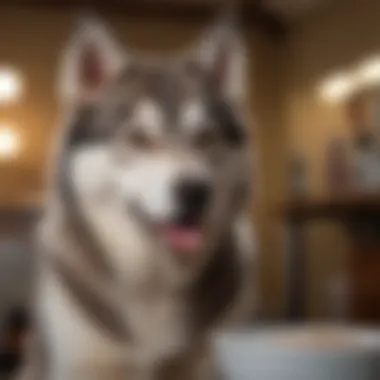Understanding Smaller Huskies: A Comprehensive Guide


Intro
The concept of smaller huskies is a fascinating subject that transcends mere aesthetics or trends. It blends elements of genetics, breed standards, and owner expectations, resulting in a unique subset of the traditional Siberian husky breed. These smaller versions often exhibit characteristics that make them appealing to potential pet owners.
This article seeks to unpack various factors that define smaller huskies, from selective breeding practices to health considerations. Conclusively, potential owners will gain insights about what to expect from smaller huskies and how to provide them with an optimal living environment.
Animal Species Profile
Preface to the Animal Species
Huskies are a medium-sized working dog breed, originally bred for their endurance and strength in harsh climates. They possess a striking appearance, characterized by captivating blue or multi-colored eyes and a thick coat designed for cold weather. Smaller huskies can be understood as a variation of this breed, often resulting from specific breeding practices.
Physical Characteristics and Appearance
Smaller huskies typically stand between 12 to 18 inches at the shoulder and can weigh anywhere from 20 to 40 pounds. These dogs retain the recognizable features of their larger counterparts, such as erect ears and a bushy tail, but often have a more compact body structure. Their coat colors and patterns mimic those of standard huskies, including black, gray, or red, often with striking facial masks or markings.
Natural Habitat and Distribution
Originally, huskies hail from Siberia, where they were bred by the Chukchi people for transportation and companionship. Today, smaller huskies may not have a distinct natural habitat, as they are primarily domesticated pets that reside in homes across various regions. Their adaptability to different environments makes them a popular choice for urban and suburban families alike.
Behavior and Social Interactions
HUSKIES are known for their friendly and sociable demeanor. Smaller huskies usually inherit these traits, making them excellent companions. They are playful and energetic, requiring regular exercise and mental stimulation. Socialization with other dogs and humans at an early age is important to prevent behavioral issues, fostering a well-adjusted pet.
"Understanding the unique traits of smaller huskies helps owners create a fulfilling environment for their pets."
Health Considerations
When evaluating smaller huskies, one must consider their health aspects. While they may benefit from the smaller size in terms of living space, they may also inherit health risks that come with selective breeding. Potential issues include hip dysplasia, eye conditions, and skin allergies.
Training Challenges
Training a smaller husky can be both rewarding and challenging. Their intelligence and independence might present obstacles in establishing effective training routines. Consistent positive reinforcement methods work best, ensuring a balance of discipline and encouragement.
Overall Suitability as Pets
In summary, smaller huskies can make great pets for families or individuals willing to commit time and effort in training and care. Understanding breed traits can aid prospective owners in deciding if a smaller husky fits their lifestyle.
In essence, smaller huskies encapsulate the charm and energetic nature of their larger relatives while offering an approachable size for various living conditions. The following sections will delve further into training techniques, health wellness tips, and choosing the right small husky for your lifestyle.
Preamble to Smaller Huskies
Smaller huskies are an intriguing subject in the world of dog breeds. They offer a unique blend of charm and energy, appealing to many dog lovers. Understanding these smaller versions of traditional huskies involves examining their characteristics, lineage, and care needs. This introduction serves as a critical lens through which one can appreciate how these animals fit into contemporary lifestyles.
For prospective owners, the importance of learning about smaller huskies cannot be overstated. They differ significantly from their larger counterparts in terms of size, temperament, and care requirements. Knowing how to appropriately meet their needs is essential when considering adopting one.
Definition and Overview
Smaller huskies are generally characterized as husky dogs that are bred to be smaller than the standard size recognized in the breed. The most popular culture refers to them as Miniature Huskies. They retain the signature features of their larger relatives, such as a thick coat, erect ears, and strikingly clear blue or multi-colored eyes. Despite their small stature, they are typically energetic and require substantial exercise.


Historical Context of the Husky Breed
The husky breed has its roots in Siberia, where these resilient dogs were bred by the Chukchi people for herding and transport. Traditional huskies are medium to large working dogs. As modern dog enthusiasts sought to create smaller companions, the trend of breeding smaller huskies began. Over time, selective breeding practices have aimed to produce dogs with a smaller frame while keeping the critical physical and behavioral traits of the original breed.
This historical context offers insights into why size variations exist within the husky breed. Understanding these origins helps one appreciate the factors that shape the unique qualities of smaller huskies today.
Characteristics of Smaller Huskies
The characteristics of smaller huskies play a crucial role in understanding their unique appeal. These dogs often attract attention due to their compact size, making them more suitable for various living environments, especially urban settings. Knowing their specific traits can help potential owners recognize the advantages and limitations that come with this sub-category of huskies. This section will explore the physical and behavioral characteristics that distinguish smaller huskies from their larger counterparts.
Physical Traits
Smaller huskies generally exhibit distinctive physical traits that set them apart from standard huskies. Typically, their height ranges from 12 to 16 inches at the shoulder, making them easier to manage and adapt to different living conditions. They often have a compact build, which contributes to their agility. Their fur is usually thick and insulated, consisting of various color patterns, including black, grey, red, and agouti.
These physical traits not only add to their aesthetic appeal but also influence their suitability as pets. A smaller size tends to lead to lower exercise requirements, which can be beneficial for those with limited space or activity time. However, it is essential to note that while they may be smaller, they retain some of the more prominent physical attributes of the husky breed, such as erect ears and striking facial markings.
Behavioral Attributes
The behavioral attributes of smaller huskies are another key aspect of their personality. These dogs are known for their friendly and playful demeanor. They tend to be more sociable than larger huskies, making them suitable companions for families and individuals alike. However, they may still exhibit high energy levels, which require regular physical and mental stimulation.
Smaller huskies often thrive on human interaction and can be quite vocal. They possess a strong instinct to communicate, leading them to howl or bark when they are excited or feel the need to express themselves. Additionally, they are intelligent dogs, capable of learning commands and tricks relatively quickly.
Training smaller huskies can present challenges, particularly if they engage in stubborn behavior. Consistent and positive reinforcement techniques often yield the best results. Understanding their behavioral traits can help owners create suitable training routines, ensuring a harmonious relationship between the dog and their environment.
"Understanding the traits of smaller huskies is vital for fostering a rewarding bond between pet and owner."
In summary, the characteristics of smaller huskies encompass distinct physical and behavioral traits that influence their suitability for various lifestyles. Recognizing these elements is essential for those considering adding one of these dogs to their family.
Selection and Breeding Practices
Selection and breeding practices play a pivotal role in shaping the characteristics of smaller Huskies. These practices determine not only the physical traits of the dogs but also their temperament and health. Understanding these aspects is essential for anyone considering owning or breeding a smaller Husky.
Trends in Selective Breeding
Selective breeding of smaller Huskies has gained traction in recent years. Breeders aim to produce dogs with specific traits that appeal to potential owners. These traits often include a compact size, friendly demeanor, and lower exercise requirements. The focus on smaller sizes can also align with urban living conditions where space may be limited.
Several breeding trends have emerged:
- Designer Breeds: Some breeders cross smaller Huskies with other breeds to produce unique characteristics. This trend has led to mixed breeds like Husky-Pomeranians or Miniature Huskies. This practice aims to retain Husky attributes while reducing size.
- Focus on Temperament: Many breeders prioritize friendly and sociable behavior. This ensures the dogs can adapt well to family environments.
- Health Considerations: A growing awareness of health issues linked to breeding is emerging. Breeders are increasingly choosing lineage based on health backgrounds.
This evolving landscape calls for potential owners to perform detailed research on breeders. They should ensure ethical practices and health screening are in place.
Impacts of Breeding on Size
Breeding practices have a profound effect on the size of Huskies. Smaller Huskies result from generations of selective breeding focused on reducing size without compromising defined Husky traits. However, this change in size is not without consequences.
Key aspects to consider include:
- Physical Health: Breeding for size can unintentionally lead to health issues. Smaller Huskies may experience joint problems or respiratory difficulties if not raised correctly. It is crucial for breeders to avoid shortcuts in breeding to ensure good health.
- Behavioral Changes: Changes in physical size may also influence behavior. Smaller Huskies might exhibit different temperaments compared to their larger counterparts. They may be more adaptable to indoor living, making them appealing urban pets. However, some may develop anxiety if not properly socialized.
- Breed Standards: The American Kennel Club does not formally recognize smaller Huskies as a distinct breed. As a result, breeding practices may lack regulation. This can lead to inconsistencies in size and behavior among the dogs.
"Understanding the implications of breeding choices is crucial for ensuring the well-being of smaller Huskies."


Health Considerations
The health of smaller huskies is a pivotal topic that deserves close attention. Like all dogs, these dogs face various health challenges that can impact their overall well-being. Understanding these challenges is essential for current and prospective owners. It is crucial to be aware of common health issues that may arise, and the significance of regular veterinary check-ups cannot be overstated. By staying informed, owners can provide better care, ensuring a happier and healthier life for their beloved pets.
Common Health Issues
Smaller huskies, while charming and affectionate, are not immune to health problems. Some of the common issues they may face include:
- Hip Dysplasia: This is a genetic condition where the hip joint is improperly formed. It can lead to arthritis and severe pain.
- Eye Problems: Conditions such as cataracts and progressive retinal atrophy are prevalent in this breed. These issues can result in vision impairment.
- Skin Allergies: Smaller huskies may suffer from allergies leading to rashes and discomfort. Identifying and managing these allergies is key.
- Obesity: Due to their smaller size, overfeeding or lack of exercise can quickly lead to obesity, which causes other health complications.
These health issues underline the importance of understanding the specific needs of smaller huskies. Responsible breeding practices can also help minimize some of these genetic conditions, but awareness and preventive care remain critical.
Importance of Regular Vet Check-ups
Routine veterinary visits are vital for smaller huskies. These check-ups provide opportunities for early detection of potential health problems. Regular visits foster a relationship between the pet and the veterinarian, which can lead to better communication about the pet's health. Some key points regarding the importance of these check-ups include:
- Preventive Care: Regular vaccinations and health screenings can prevent various diseases and conditions.
- Early Detection: Many health issues can be managed more effectively when identified early. This includes conditions like diabetes or kidney disease.
- Weight Management: Vets can provide guidance on diet and exercise, helping to maintain a healthy weight.
- Dental Health: Regular check-ups include dental examinations to prevent periodontal disease, which is common among dogs.
Regular health check-ups are not just a service; they are a crucial step towards a long and happy life for your smaller husky.
In summary, health considerations form a cornerstone of responsible pet ownership for smaller huskies. Being proactive about their health can lead to a better quality of life. Awareness of common health issues, alongside the commitment to regular vet visits, will ensure these delightful dogs thrive in their homes.
Training Smaller Huskies
Training smaller huskies is essential for their overall development and integration into family life. These dogs, known for their spirited personalities and energy, require a dedicated training approach. Proper training not only enhances obedience but also strengthens the bond between the pet and its owner. Smaller huskies can exhibit challenging behaviors without consistent training. Thus, understanding and implementing effective training techniques is critical.
Basic Training Techniques
When working with smaller huskies, starting with fundamental training techniques brings positive results. Consistency is key. Establish clear rules and stick to them. Dogs thrive on routine and knowing what to expect. Here are some basic techniques to consider:
- Positive Reinforcement: Use treats and praise to reward good behavior. This encourages repetition of the desired actions.
- Short Sessions: Keep training sessions brief, ideally 5 to 10 minutes. Smaller huskies have short attention spans, so making sessions engaging is vital.
- Basic Commands: Teach essential commands such as "sit", "stay", and "come". Each command should be practiced regularly.
- Leash Training: Begin leash training early. Smaller huskies can be quite strong for their size, so teaching them to walk nicely on a leash helps manage their energy.
Through these techniques, smaller huskies can learn the basics that lead to more advanced training down the road.
Socialization Needs
Socialization is crucial for smaller huskies. Exposing them to different environments, people, and other animals builds confidence and reduces fearfulness. A well-socialized dog is generally more adaptable and less likely to develop behavioral issues.
- Early Exposure: Start socialization early, ideally when they are puppies. Introduce them to various settings such as parks, busy streets, and social gatherings.
- Positive Interactions: Encourage positive interactions with other pets and humans alike. A dog that is well-adjusted to diverse situations is easier to manage.
- Gradual Introduction: Introduce new experiences gradually to avoid overwhelming the dog. Each new experience should be met with praise and rewards, reinforcing the idea that new situations are safe.
- Ongoing Socialization: Socialization is not just for puppies; it is a lifelong process. Regular trips to dog parks or playdates with other dogs are beneficial at every stage of life.
Effective socialization can improve your smaller husky's behavior in various situations, making them a joy to have at home and in public.
By focusing on these training and socialization methods, owners can ensure smaller huskies become well-mannered companions. They will also embody the spirited nature characteristic of the breed while being comfortable in diverse environments.
Proper Care for Smaller Huskies
Caring for smaller huskies requires a comprehensive approach tailored to their unique needs. These dogs may have different nutritional requirements and exercise patterns compared to their larger relatives. Understanding these elements is crucial for their well-being and happiness. Proper care can lead to a fulfilling relationship between owners and their pets, ensuring that smaller huskies live healthy and active lives.
Diet and Nutrition
Nutrition plays a vital role in the health of smaller huskies. Their smaller size can lead to faster metabolism, making it essential to provide them with a diet rich in quality ingredients. Here are key points about their dietary requirements:


- Quality Protein Source: Smaller huskies need high-quality protein to maintain muscle mass and energy levels. Ingredients such as chicken, fish, and lamb are excellent choices.
- Balanced Diet: The diet should include a balance of proteins, fats, and carbohydrates. Whole grains, fruits, and vegetables can provide necessary vitamins and minerals.
- Portion Control: Smaller huskies are prone to obesity, which can lead to various health problems. Regular portion control is necessary to keep them at a healthy weight.
- Hydration: Fresh water should always be available. Proper hydration is essential for digestion and overall health.
Owners should consult with veterinarians to develop a nutritional plan that meets the specific needs of their smaller husky. Additionally, it is helpful to transition between different dog foods gradually to avoid digestive issues.
Physical Exercise Requirements
Regular exercise is crucial for the health of smaller huskies. Despite their size, they possess high energy levels and a natural inclination for play and exploration. Here are some important considerations:
- Daily Exercise: Smaller huskies should engage in at least 30 to 60 minutes of exercise every day. This can include walking, running, or playing in a secure area.
- Variety in Activities: Offering diverse physical activities helps to keep smaller huskies mentally stimulated. Activities such as fetch, agility training, and even puzzle toys can be beneficial.
- Social Interaction: Engaging with other dogs is also essential. This helps improve their social skills and allows for play, which is important for their emotional well-being.
- Monitor Responses: Owners should always pay attention to their huskies during exercise. If signs of fatigue or discomfort appear, it may be necessary to adjust their activity level.
Incorporating these aspects into your smaller husky's care routine is vital for their long-term happiness and health. The right diet and consistent exercise not only promote physical well-being but also contribute to a nurturing companionship.
Smaller Huskies in Family Settings
Understanding the role of smaller huskies in family environments is crucial for potential dog owners. These dogs are not just pets; they become a part of the family dynamic. Their temperament, size, and energy levels influence how well they fit into various living situations.
Compatibility with Children
Smaller huskies often exhibit a friendly and playful nature, making them generally compatible with children. Many families appreciate this breed’s ability to engage in activities with kids. However, it is important to ensure that interactions between smaller huskies and children are supervised. Smaller huskies should be socialized from a young age to develop the right temperament around children. Training and proper exposure can help minimize any behavioral issues that may arise. It is noteworthy to consider the energy of children. Smaller huskies also possess a lively spirit, which may match well with active kids.
- Advantages for Families with Children:
- Playfulness: Smaller huskies often love to play, which can lead to enjoyable bonding experiences for both children and the dog.
- Loyalty: They tend to be loyal companions, offering emotional support to children, which is a valuable aspect of canine ownership.
Nevertheless, every dog has its individual personality. Therefore, it is essential for families to assess the specific dog's temperament before introducing it to young children. Some smaller huskies may be more reserved, while others can be excited and exuberant.
Interactions with Other Pets
The approach of smaller huskies towards other pets varies greatly. Generally, they can adapt well to multi-pet households if introduced correctly. They do possess a strong prey drive, typical of the husky breed, which may lead to chasing smaller animals. Introduction should be gradual, allowing all parties to become accustomed to one another in a neutral setting.
- Positive Interaction Strategies:
- Controlled Introductions: Always allow first meetings to happen on neutral ground to help create a less stressful environment.
- Training and Commands: Ensuring all pets understand basic commands can facilitate smoother interactions.
Furthermore, smaller huskies can form strong bonds with other dogs of similar or smaller size. They benefit from positive reinforcement during playtime to ensure interactions remain healthy.
Epilogue on Smaller Huskies
The conclusion on smaller huskies is crucial since it ties together various themes discussed throughout the article. Understanding these dogs extends beyond their cute appearance. It involves appreciating the complexities of their breeding, health needs, training, and their role in a family dynamic. As a distinct segment of the husky breed, smaller huskies offer unique traits that potential owners must consider before adopting.
One significant element is their adaptability. Smaller huskies can thrive in various environments, but they also come with specific requirements. Owners need to know how to cater to their needs appropriately. Additionally, Owners need to be aware that smaller huskies may inherit some health issues common in the breed. It emphasizes the necessity of maintaining regular vet visits, especially as they grow.
Furthermore, the behavioral aspects cannot be overlooked. Smaller huskies often exhibit playful and energetic traits, making them great companions. However, they also require consistent training to harness their spirited nature. This means owners must commit to a training regime that is both structured and flexible.
While these dogs can fit into many home settings, the traits of smaller huskies must align with the lifestyle of their future family. Understanding this alignment will lead to more successful adoptions and happier homes.
"Successful dog ownership requires understanding, patience, and a commitment to learning."
Recap of Key Points
- Defining Smaller Huskies: Smaller huskies are not merely a size variation but also have specific needs and traits.
- Health Considerations: Regular vet check-ups are essential to catch common issues early, which can lead to a healthier life for the dog.
- Training Needs: Consistent and patient training is vital for their development and behavioral management.
- Compatibility with Families: Potential owners must evaluate their readiness to provide a suitable environment for smaller huskies.
- Benefits of Adoption: Adopting a smaller husky can bring joy, but it is also a responsibility that requires informed decision-making.
Final Thoughts for Potential Owners
For those considering adopting a smaller husky, it is crucial to weigh all aspects keenly. Their adorable appearance and lively demeanor can be enticing, but potential owners should examine their ability to meet the dog's needs consistently. These dogs require not just physical exercise but also mental stimulation and emotional bonding.
Committing to a smaller husky means embracing a companion that needs guidance, care, and love. While they can integrate well into family life, understanding how they interact with children and other pets will inform their successful introduction into any household. Lastly, ongoing education about the breed is an important aspect of responsible ownership. Information is key in ensuring not just a good match but also a long, fulfilling relationship with a smaller husky.







